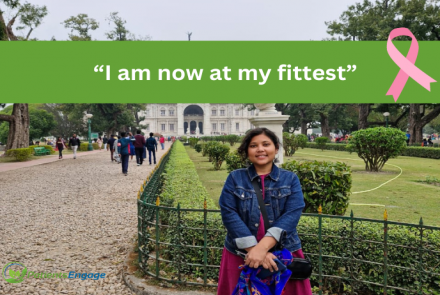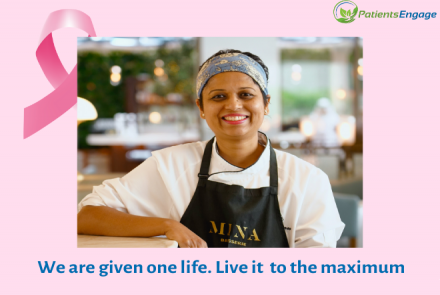
Waiting for medical test results can be the hardest part, but you can make it easier. In a heart-warming article, Usha Jesudasan, relates how she became a nervous wreck when her mother was diagnosed with breast cancer, and how the composed, comforting presence of her son gave her strength to face her diagnosis.
At some point, most of us will accompany someone we love to a hospital or a doctor. We go, because we care about the person who felt the lump in her breast, or has had blinding headaches for a while, or constant bleeding, or other scary symptoms. It may be our first experience of such an accompaniment. The news of the person’s health concerns may have come as a shock to us. We may be in denial ourselves, “Oh I’m sure it’s nothing serious,” or we may panic, “Oh no!” What should we do or say to our loved ones as we sit with them in a waiting room full of strangers?
In 2009, my mother, after her bath, casually said, “ Just take a look at my breast.” I did and was horrified to see an inverted nipple. She thought these things happened to one’s body as one got older and was quite blasé about it. I knew differently. It could be one of the signs of breast cancer. My mind raced alone. I was a hundred and thirty kilometers away from my home in Vellore where the best hospital was. Within an hour, I had made an appointment with a specialist doctor, packed Ma’s bags and had brought her to Vellore. She was in quite a daze and wondered why I was fussing so much.
The doctor prescribed some tests and all the procedures were done quickly. A few days later we came back for the results. While waiting in the waiting room, I happen to glance at my mother. Mother’s face was so composed and calm. No sign of anxiety or fear. I was so nervous; I fidgeted looking for things in my bag that were not there. I held my mother’s hand so tightly that after a while she slipped her hand away. I began to chatter…… “Do you remember your lovely coffee and walnut cake Ma……what did you think of this book…..” then finally, “It’s probably nothing serious Ma….I could really do with a nice cup of coffee, couldn’t you?” When our name was called, I just wasn’t ready to go. My mother gently nudged me to get up.
The elderly doctor got up and greeted my mother at the door and seated her. He looked kind and gentle. “The news is not so good,” he said. “It is cancer.” I put my head on the table and started to weep. I could not bear this news. After a good few minutes, my mother gave me her handkerchief and sternly told me to compose myself.
I look back on this memory with great shame and wish that I had done things differently. Right from the moment Ma showed me her breast, my thoughts and fears were only for myself. “I can’t bear this…..what will I do….how can this happen to me?” At no time can I remember asking my mother how she felt? Or comforted her in the way that she would have liked to have been comforted. Or heard her fears and concerns. Within a day, she was admitted in hospital and operated on. She went on to live another six wonderful years.
A few years later, I myself was in the same position, back in the waiting room with my son John as the one who accompanied me. John is the gentle, silent type. I could see the panic that I once felt, in his eyes. I had discovered a lump in my breast, remembered what my mother had gone through, and was terrified of the whole process of tests and surgery. But he remained calm. No chattering. No fidgeting. No fussing. Just a warm arm around me. Now and then he would ask, “Are you alright Amma?” and hold me a little closer, so I could rest my head on his shoulder. That was so comforting. I knew that whatever bad news was in store for me, nothing terrible could happen as long as he was with me. I had that reassurance. That was all I needed.
I relate both experiences, as both can be identified with. We are either the chattering, nervous ones who flap our hands and cry thinking only of our own needs, or the strong, comforting ones who put our own heart break away and focus on the person we are with.
How can we be strong and comfort our loved one even though we may be on the verge of heart break ourselves?
- Remind yourself that you are with another person who is about to face news that will change their life.
- Put yourself in their shoes.
- Don’t chatter about yourself.
- Don’t use your ear plugs to listen to music.
- Put away your cell phone.
- Don’t bring a book to read.
- Don’t go away to the coffee shop.
- Don’t try and distract them by saying, “Look at those flowers, aren’t they lovely?”
You may want to:
- Ask your loved one if they want to ask the doctor anything specific and write it down for them.
- Ask them what it is they are afraid of most and talk of ways of facing those fears together.
- Hold your loved one’s hand gently. Warmth from your hand will comfort.
- Put your arm around the person, reassuring them of your love.
- Write a short note assuring them that no matter what the news may be, they will not have to deal with it alone, that you will always be there to care for them.
- Make the experience one which both you and your loved one will treasure!
Usha Jesudasan had previously written on 7 Tips For Living With Chronic Illness
(Usha Jesudasan is a freelance writer who writes about life, values, and the harmony we need within ourselves and our neighbours to live well. Some of the books she has authored are - ‘I Will Lie Down In Peace’, ‘Two Journeys’, ‘Healing As Empowerment: Discovering Grace in Community’)
















